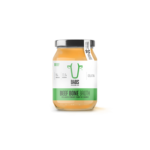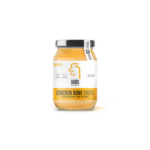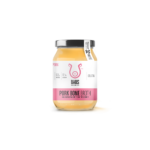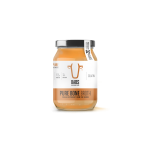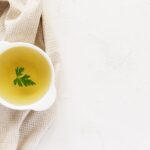Making sudden large, revolutionary changes to many different aspects of your life at once becomes another source of additional, unnecessary stress—an excellent way to hamper or even thwart your plans to become healthy.
The pace at which you should introduce changes to guarantee comfortable, surefire results and a peaceful transition period is different for everyone. But it should never cause excessive discomfort or involve heavy sacrifices! 🙇
Of course, you should count on a bit of unpleasantness, which may worry or even discourage you at the beginning. There’s no such thing as a free lunch!
At Babs Bone Broth – Nourishing Food Company we have the so called Dietary Desiderata – The Fifteen Commandments Of Healthy Eating. These commandments will encourage you to take the necessary steps for a peaceful transition period to a healthier and balanced lifestyle.
Bone Broth for Runners and Triathletes: A Great Training Aid for Hard Workouts
Whether you’re training for your first 5K run or you’re a seasoned triathlete,...
Read MoreWhat is gelatin?
Gelatin is a great source of nutrients that are widely beneficial to your...
Read MoreWhat is bone broth?
The methods for making bone broth today have been modernized for efficiency, sanitation,...
Read More#1. Our lives are based on the energy and life found in our food.
Fresh food contains many active enzymes. These enzymes are like a spark, without which you couldn’t light even the feeblest flame. Highly processed, lifeless food forces the body into a state of stagnation. The food we eat should be fresh, organic, and locally grown. Try to make sure it is unprocessed or minimally processed before it’s eaten.
#2. Eat when you’re hungry, and stop when you’re full.
Finish your meal when you feel satisfied, not when you’re full to bursting. Overeating is just as harmful as undereating. Your brain doesn’t receive the satiety signal and eliminate your feeling of hunger until twenty minutes after you’ve finished your meal.
“Everything flows; nothing stands still”
#3. Relax during meals.
Food should be eaten in a pleasant, calm atmosphere. By turning off the TV and avoiding heated discussions, you’ll avoid digestive issues and appreciate the taste, fragrance, and wonderful appearance of the dishes served.
#4. Eat local, seasonal products.
The changes in season guarantee a marvelous variety of foods to consume. We should take advantage of this natural offering. Seasonal food appears when it is of the highest quality, at the peak of freshness and at its greatest nutritive value.
#5. Don’t be a pack rat—go shopping often!
Shop for fresh products at least twice a week; don’t let them accumulate in the fridge or pantry. Purchase amounts that you can eat relatively quickly, without leaving your food to wilt, go bad, or get freezer burned.
#6. Become a snob—only buy products that are organic and ecofriendly.
Traditionally farmed plants contain much higher levels of antioxidants, minerals, and vitamins than those cultivated as part of large commercial crops awash in chemical agents. Organic production protects the soil and water and treats animals humanely. These aren’t the slogans of some “green” ecofanatics or commercial swindlers but an absolute rule of life for those wise enough to take responsibility for themselves! If such people are snobs—then be a snob!
#7. Eat as many vegetables as you can and limited amounts of fruit.
Fresh, organic fruits and vegetables are true treasure troves of minerals and vitamins. They boast valuable fiber and phytochemical substances that protect us from cancer, heart disease, and many other devastating illnesses. The fiber from fruits and vegetables is essential to the proper functioning of many processes in the digestive system. If too much of our fiber comes solely from cereal grains, this leads to nutritional deficiencies, since cereals block the absorption of nutrients and interfere with the digestive system’s elimination of waste.
#8. Eat only high-quality animal protein from organically raised creatures and small, wild saltwater fish, which are marked by their high levels of EPA and DHA omega-3 fatty acids.
#9. Be suspicious of white foods;
in fact, it’s best to avoid them altogether. White flour, white sugar, white salt, and milk that has been pasteurized and homogenized should be taken off our shopping list. If you want certain products and you can’t find raw, ecofriendly ones, opt for those labelled as certified organic.
#10. If you can’t figure out what’s in a product without a chemical dictionary and magnifying glass—don’t eat it!
It’s not good for your eyes, your knowledge, or (especially) your liver.
#11. Season your food with sea salt
(e.g., Celtic sea salt), Himalayan salt (which looks like tiny amethyst crystals), or New Zealand salt, since they contain many valuable microelements and almost no heavy metals.
#12. Never forget that without water, life is impossible.
Drink 1.5 to 2 liters of this priceless, life-giving liquid each day. Don’t try to cheat and count tea, juice, beer, or coffee as water. Water is water, and nothing can replace it. If you don’t have access to a natural, tested water source, then buy the best brands on the market. Check to see that the bottles haven’t been overheated or left to stand in the sun or by the heater. In such cases, the water can become contaminated with toxins from plastic bottles. The easiest solution is to drink water from glass containers, adding a pinch of sea salt to enrich it with additional minerals.
#13. Give up harmful foods that make you feel bad after eating them, since this has a destructive impact on your health.
#14. Following a proper diet for your metabolic type and changing your habits and lifestyle are more pleasant and easier than continually taking medications now or in the future.
When we keep such important aspects of our daily functioning in mind, we can avoid or reduce this risk to the very minimum. Try to eliminate the causes of an illness, not its symptoms.
#15. Live according to the 80:20 principle,
which should be interpreted in the following optimistic way: if you take care of yourself sensibly and responsibly 80 percent of the time, the remaining 20 percent can be spent indulging yourself and joyfully exclaiming, “You only live once! Let the good times roll!”




